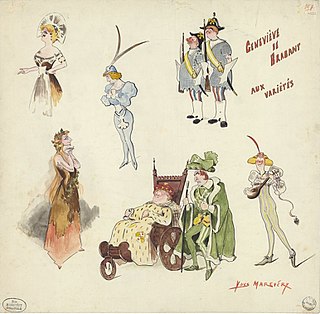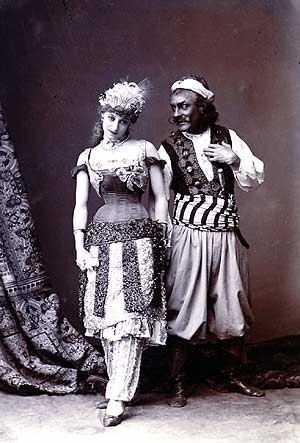
Orpheus in the Underworld and Orpheus in Hell are English names for Orphée aux enfers, a comic opera with music by Jacques Offenbach and words by Hector Crémieux and Ludovic Halévy. It was first performed as a two-act "opéra bouffon" at the Théâtre des Bouffes-Parisiens, Paris, on 21 October 1858, and was extensively revised and expanded in a four-act "opéra féerie" version, presented at the Théâtre de la Gaîté, Paris, on 7 February 1874.

Jacques Offenbach was a German-born French composer, cellist and impresario of the Romantic period. He is remembered for his nearly 100 operettas of the 1850s to the 1870s, and his uncompleted opera The Tales of Hoffmann. He was a powerful influence on later composers of the operetta genre, particularly Johann Strauss Jr. and Arthur Sullivan. His best-known works were continually revived during the 20th century, and many of his operettas continue to be staged in the 21st. The Tales of Hoffmann remains part of the standard opera repertory.

Henri Meilhac was a French dramatist and opera librettist, best known for his collaborations with Ludovic Halévy on Georges Bizet's Carmen and on the works of Jacques Offenbach, as well as Jules Massenet's Manon.

Ba-ta-clan is a "chinoiserie musicale" in one act with music by Jacques Offenbach to an original French libretto by Ludovic Halévy. It was first performed at the Théâtre des Bouffes Parisiens, Paris, on 29 December 1855. The operetta uses set numbers and spoken dialogue and runs for under an hour.

Henry Brougham Farnie, often called H. B. Farnie, was a British librettist and adapter of French operettas and an author. Some of his English-language versions of operettas became record-setting hits on the London stage of the 1870s and 1880s, strongly competing with the Gilbert and Sullivan operas being played at the same time.

Geneviève de Brabant is an opéra bouffe, or operetta, by Jacques Offenbach, first performed in Paris in 1859. The plot is based on the medieval legend of Genevieve of Brabant.

Étienne Victor Tréfeu , was a French librettist, song writer and theatre manager. He is best known for his work with Jacques Offenbach. He originally came to prominence as a writer of popular songs. In 1873 he became the administrator of the Théâtre de la Gaîté in Paris.

Robert Reece was a British comic playwright and librettist active in the Victorian era. He wrote many successful musical burlesques, comic operas, farces and adaptations from the French, including the English-language adaptation of the operetta Les cloches de Corneville, which became the longest-running piece of musical theatre in history up to that time. He sometimes collaborated with Henry Brougham Farnie or others.

Le voyage dans la Lune is an 1875 opéra-féerie in four acts and 23 scenes by Jacques Offenbach. Loosely based on the 1865 novel From the Earth to the Moon by Jules Verne, its French libretto was by Albert Vanloo, Eugène Leterrier and Arnold Mortier. This was another prolific year for the composer, that included also the third version of Geneviève de Brabant, Les hannetons, La boulangère a des écus, La créole and a waltz for Tarte à la crême.

Charles-Louis-Étienne Nuitter was a French librettist, translator, writer and librarian born in Paris, France, on 24 April 1828. He died there on 23 February 1899 after suffering a stroke a few days before.

Dick Whittington and His Cat is the English folklore surrounding the real-life Richard Whittington, wealthy merchant and later Lord Mayor of London. The legend describes his rise from poverty-stricken childhood with the fortune he made through the sale of his cat to a rat-infested country. However, the real Whittington did not come from a poor family of common stock, and there is no compelling evidence supporting the stories about the cat, or even whether he owned one.

La chatte métamorphosée en femme is a one-act opéra comique of 1858 with words by Eugene Scribe and Mélesville, and music by Jacques Offenbach.

Il signor Fagotto is a one-act opérette by Jacques Offenbach to a French libretto by Charles-Louis-Étienne Nuitter and Étienne Tréfeu, first performed in 1863. The story of a father outwitted and true love winning is set within "a burlesque of musical styles".

Maître Péronilla is an opéra bouffe in three acts of 1878 with music by Jacques Offenbach. The French libretto was by the composer with Charles-Louis-Étienne Nuitter and Paul Ferrier.

Dandy Dick Whittington was an opéra bouffe in two acts, written by George Robert Sims and composed by Ivan Caryll, based on the folktale Dick Whittington and His Cat. In this version, Dandy Dick performs in a circus and loves the owners' daughter. The circus goes to Siam, where Dick unexpectedly receives a high office and marries his sweetheart. The opera premiered at the Avenue Theatre in London on 2 March 1895 and closed on 13 July 1895. It starred May Yohé as Dick Whittington, Ethel Haydon as Alice, and Henry Wright as Larry O'Brannagan. The conductor was Landon Ronald.

Théodore Lajarte was a French musicologist, librarian, and composer.

La Princesse de Trébizonde is an opéra bouffe with music by Jacques Offenbach and text by Étienne Tréfeu and Charles-Louis-Étienne Nuitter. The work was first given in two acts at the Theater Baden-Baden on 31 July 1869 and subsequently presented in a revised three-act version at the Théâtre des Bouffes-Parisiens on 7 December of the same year.

Henri Tayau was an operetta singer and actor, and violinist, who during a short but successful career performed many light tenor roles in opéra-bouffes of Offenbach, and created several roles, the most notable being that of Orphée in Offenbach's greatest success, Orphée aux Enfers.

Félicie Marie, called Félicia Thierret, around 1814 – 1 May 1873 was a French comedian.














